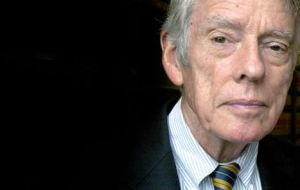MercoPress. South Atlantic News Agency
Griesa praises Pollack's 'great skill” and reveals he directed the use of 'default'
 “It would be a gross injustice and would drastically interfere with the process which has been going on and must continue” said Griesa
“It would be a gross injustice and would drastically interfere with the process which has been going on and must continue” said Griesa U.S. District Judge Thomas Griesa on Monday turned back an effort by Argentina's government to remove the court-appointed mediator in the dispute with creditors that triggered a 'selective default' situation by the country last week. He also revealed that the default condition was at his direction and was 'accurate'.
Griesa dismissed Argentine complaints that mediator Daniel Pollack has not been an impartial mediator in their battle with investors who refused to accept a debt restructuring after the last time the country defaulted, in 2001.
Referring to Pollock by his legal title of special master, Griesa praised his work in handling the dispute, saying he has acted with “great skill” and been even-handed with all parties.
“It is hard to imagine a worse move that the court could make than to remove the special master,” Griesa said. “It would be a gross injustice and would drastically interfere with the process which has been going on and must continue.”
Jonathan Blackman, an attorney for Argentina, criticized Pollack and called for his removal after the mediator issued a statement declaring that the country would be 'imminently in default' following the breakdown in talks July 30.
Blackman said the statement undermined Argentina's position in financial markets. His criticism was echoed Monday by Cabinet Chief Jorge Capitanich, who told reporters that Pollack has acted as a “spokesman for the vulture funds,” the preferred Argentine term for the U.S. investors who are its opponents in the dispute.
Griesa said that Pollack issued the statement about default at his direction and that it was accurate.
The investors have been seeking 1.5 billion dollars for bonds defaulted on by Argentina in 2001. The country settled with most of its creditors by trading lower-value bonds for defaulted debt, but a group of holdouts, led by New York-based hedge fund NML Capital Ltd., refused to accept that deal. The government, in turn, said it could not settle with the holdouts without offering similar terms to the others.
Griesa, in a decision affirmed by the U.S. Supreme Court, ruled Argentina could not pay the other creditors until it settled with the holdouts. That triggered a default when Argentina was prevented from paying 539 million dollars in interest due by July 30, threatening to derail an economy already in recession.
Several international banks were reportedly in negotiations Monday to buy the Argentine bonds held by the holdout investors, which would allow Argentina to exit default.
The negotiations, disclosed by the Argentine financial newspaper Ambito Financiero and other media, were said to include J.P. Morgan, Citibank, HSBC and Deutschebank.




Top Comments
Disclaimer & comment rules-

-

-

Read all commentsHopefully JP Morgan and others buy the bonds .
Aug 05th, 2014 - 08:10 am 0@1 Good idea, get others to clear up the mess you made, while denying it was your mess in the first place and complaining that the definition of mess is all wrong.
Aug 05th, 2014 - 08:29 am 0Argentina, the stroppy teen of the international community.
This might happenhowever, I wondering how to sell this to your credit department. You pay 1.6bn upfront and then negotiate with a government who is not willing to pay anywhere near this amount. There is no upside and you are effectively jsut taking the loss for the government...
Aug 05th, 2014 - 08:39 am 0Commenting for this story is now closed.
If you have a Facebook account, become a fan and comment on our Facebook Page!